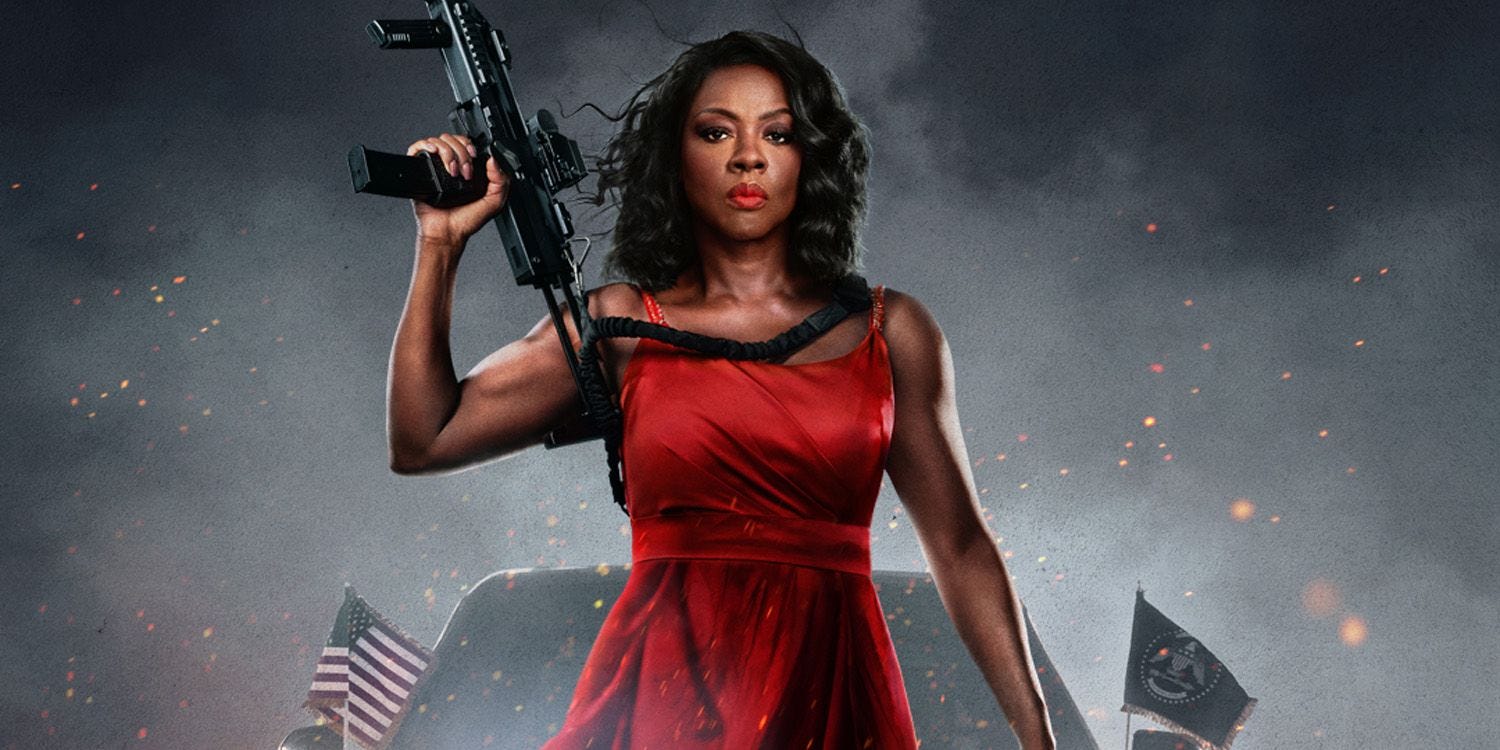Strength, Stillness & a Streaming Surprise
There’s something powerful about reclaiming your strength — especially after surgery, after cleaning your home in preparation for family, and after making space for peace in the middle of recovery. That’s where I found myself. Surrounded by laundry, sunlight, and a quiet moment of stillness, I pressed play on a new action film I’d heard whispers about — G20 starring the incomparable Viola Davis.
I didn’t expect to feel so seen.
Here was a Black woman — not just in the White House, but running it — navigating grief, strategy, leadership, and hand-to-hand combat like it was Tuesday. As I watched while folding clothes and resting, I was reminded that power doesn’t always come in a roar. Sometimes, it’s in the calm after the storm. Sometimes, it’s a mother, a wife, or a president—commanding the moment with equal parts grace and grit.
The Summit That Turned into a Siege
G20, directed by acclaimed Mexican-American filmmaker Patricia Riggen, takes the well-worn structure of the classic action film — a global threat, a heroic leader, a ticking clock — and reshapes it with powerful intention. This time, the face of strength, leadership, and decisive action is that of a Black woman, front and center: President Danielle Sutton, portrayed with quiet fire and commanding grace by Oscar winner Viola Davis.
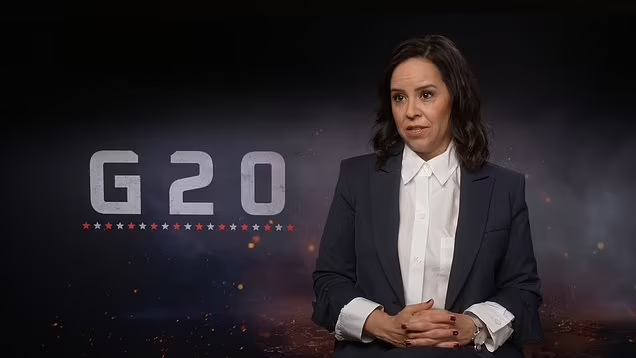
G20’s Director, Patricia Riggen,
The story follows President Sutton as she travels to the G20 Summit in Cape Town, South Africa, accompanied by her husband, Dereck Sutton (Anthony Anderson); teenage daughter Serena Sutton (Marsai Martin); and her young son, Demetrius Sutton, played by rising young star Christopher Farrar (Abbott Elementary, Chicago Med, Atlanta). The family represents a rare vision on screen: a strong, loving, intelligent Black first family navigating the highest political office in the world.
Serena and Demetrius hold their own in the film’s emotional core — Serena embodying courage and clarity under pressure, and Demetrius capturing the wide-eyed vulnerability of a child suddenly caught in a nightmare. The mother-daughter bond between Viola and Marsai is especially resonant, setting the stage for one of the film’s strongest emotional throughlines (more on that in Part 3).
As the global summit unfolds, the unthinkable happens: a violent terrorist group led by Rutledge (Antony Starr, known for his chilling turn in The Boys) storms the G20 compound. Sutton, separated from her family and security detail, narrowly escapes and connects with her lead Secret Service agent Manny Ruiz (played by Ramón Rodríguez, Will Trent), as well as a small group of other world leaders. Together, they become the last hope for reclaiming the summit and preventing global catastrophe.
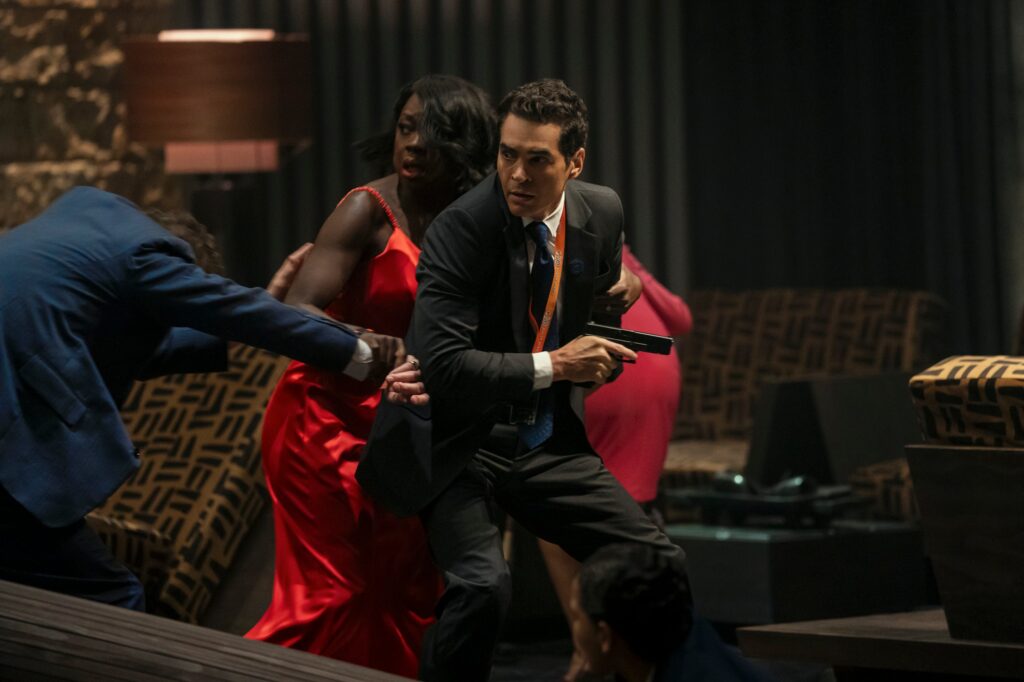
Ramón Rodríguez as Secret Service agent Manny Ruiz fights to protect President Sutton (Davis)
Sutton’s military instincts kick into high gear, and she delivers on her promise as both commander-in-chief and protector. With steely resolve, she operates with the mindset of “leave no one behind,” not just defending her own family but working to rescue others held captive — from fellow leaders to local kitchen staff who were caught in the crossfire.
Among those captured is Melokuhle, portrayed by South African actor Theo Bongani Ndyalvane. Though his lines are few, his presence is unforgettable. Initially one of the kitchen staff being held hostage, we learn Melokuhle has been strategically embedded for protection. He moves with precision and quiet strength — especially when stepping in as an unexpected protector for Sutton’s children. Theo is undoubtedly an actor to watch, bringing layered intensity to a subtle but pivotal role.
The film’s production journey is just as noteworthy. As shared by Anderson and Martin during a press run interview on The Breakfast Club, G20 was shot in Cape Town during South Africa’s winter season, only to be paused during the 2023 SAG-AFTRA strike. The cast and crew later returned post-strike to complete filming in the heat of summer. That restart — across seasons, time zones, and tensions — underscores the commitment behind the storytelling.
And it shows. From Riggen’s direction to the on-screen chemistry of the cast, G20 delivers a thriller that’s rooted in purpose. Every punch, every decision, every sacrifice is layered with meaning — because it’s not just about saving the world. It’s about who gets to lead it.
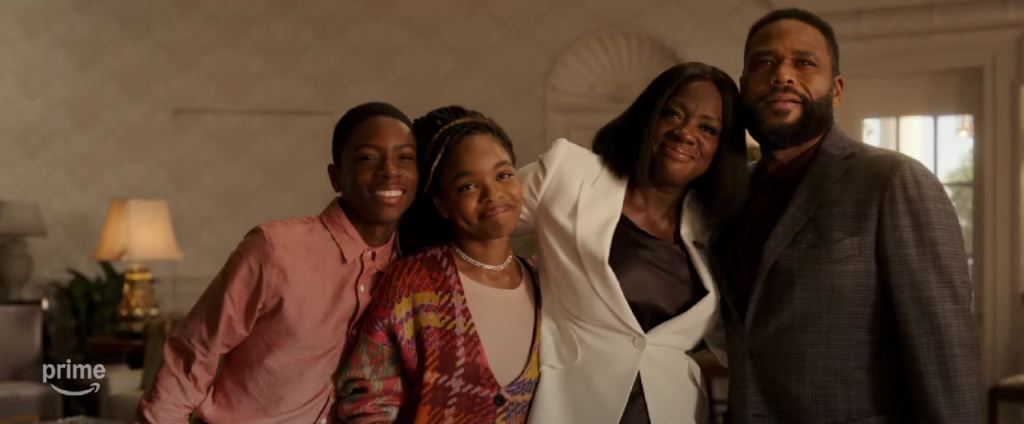
When Presence Becomes Power
Before the bullets fly or the summit descends into chaos, G20 opens with a quieter kind of tension: a fractured relationship between a mother and daughter. President Danielle Sutton and her teenage daughter Serena (Marsai Martin) are at odds — emotionally distant, buffered by protocol, and struggling to connect under the weight of public life. It’s a bold and smart choice by director Patricia Riggen, to ground the film in family dynamics before dropping us into global warfare.
That opening tension anchors the film’s heart. Viola Davis, as always, doesn’t just act — she inhabits. Her President Sutton is layered: authoritative yet vulnerable, poised yet deeply maternal. It’s in the way she navigates diplomacy with grit, then turns around and gently pleads with her daughter to understand the weight of her role. Every glance, breath, and pivot is intentional. This is a woman who knows war — and carries the cost of leadership in her body.
Marsai Martin shines in her own right, showing maturity and nuance as Serena Sutton. It’s a role that balances defiance and devotion, reminding us that even in the corridors of power, teenage daughters just want to be heard. The moments between Viola and Marsai — especially when things shift later in the film — are among the most emotionally satisfying scenes, marking a powerful portrayal of Black mother-daughter love.
Anthony Anderson, in a refreshing departure from his comedic comfort zone, brings grounding warmth and subtle depth as Dereck Sutton, the First Gentleman. His chemistry with Viola is organic, and his scenes with both Marsai and Christopher Farrar feel deeply rooted in love. There’s something quietly revolutionary about seeing a Black man supporting his powerful wife without ego — just heart.
Christopher Farrar, portraying Demetrius Sutton, may be the youngest in the cast, but his presence is memorable. He’s the emotional anchor of innocence in a world gone mad, and his connection to both Serena and their parents feels genuine and lived-in. In many ways, the Sutton children reflect the stakes that President Sutton is willing to risk everything for — and why her mission matters.
Then there’s Ramón Rodríguez, who adds a strong layer of emotional investment as Agent Manny Ruiz. He’s not just the muscle behind the mission — he’s the embodiment of trust. Rodríguez plays Ruiz as fiercely loyal but deeply human, and the respect between him and President Sutton is felt in every exchange. Their alliance is not about hierarchy, but shared purpose.
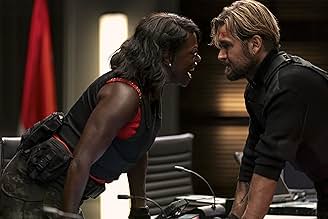
A notable nod must go to Antony Starr, whose chilling portrayal of the film’s antagonist Rutledge simmers with menace. With military precision and ice-cold calculation, Starr’s performance raises the stakes without tipping into cartoon villainy. He’s grounded in a greed that feels disturbingly real — and timely.
And then… there’s the music.
During the film’s early establishing scenes — as the Sutton family arrives in Cape Town, South Africa, greeted by sunlight and political fanfare — the unmistakable rhythm of “Pata Pata” by the legendary Miriam Makeba fills the air. Co-written by Makeba and Jerry Ragovoy, the song is more than just a backdrop; it’s a cultural anchor. Makeba, often called “Mama Africa,” was a world-renowned South African singer and activist known for her musical brilliance and her outspoken fight against apartheid.
Hearing Pata Pata as the Suttons step foot into Cape Town brought me right back — to a memory of walking through Brooklyn, visiting South African restaurants, and hearing that same joyful, lilting melody play in the background. That moment transported me. And it hit me: the filmmakers were crafting a tone, one that echoed the visual poetry of T’Challa’s return to Wakanda in Black Panther — regal, rooted, and full of pride.
There’s a subtle elegance to that choice. Without shouting it, the film whispers: You belong here. Your story matters here. Your legacy is global.
From the wardrobe to the scenery, from the subtle nods to South African heritage to the casting of Theo Bongani Ndyalvane — a South African actor who, though given few lines, moves with quiet authority and intention — G20 centers international Black excellence. Ndyalvane’s portrayal of Melokuhle, a protective force embedded in the chaos, reminds us that heroism doesn’t always come with fanfare. He is an actor to watch, and his presence adds authenticity and calm strength to the film’s tense second half.
All in all, G20 is more than a thriller. It’s a meditation on what it means to lead. To protect. To forgive. And to rise — as a woman, a mother, and a president — even when the world expects you to fall.
Clarity, Connection & a Confident Pushback
Let me be clear.
I am a fan of every single actor featured in G20. From Viola Davis to Anthony Anderson, Marsai Martin, Christopher Farrar, Ramón Rodríguez, and even the fierce few lines delivered by Theo Bongani Ndyalvane — this cast showed up and gave what needed to be given. This film was an encouraging watch during a personal time of recovery for me, and that matters.
Now, yes — action films tend to follow a formula. We’ve seen this setup before: global summit, hostage situation, a hero on the inside. But here’s the thing: originality doesn’t always come from plot — it comes from perspective. And what we rarely see is a Black woman, a mother, a wife, portrayed as the commander-in-chief — not just in title, but in action. That alone makes G20 worth watching.
I’ve read some of the early critiques calling G20 a “paint-by-numbers” thriller. And to that, I say: so what if it paints by numbers when the palette is this rich, and the brush is held by someone who rarely gets to paint at all? Representation is the revolution. And I’ll always show up to see Viola Davis at the helm of any story — especially one where she’s dodging bullets and balancing diplomacy.
Under Patricia Riggen’s direction, you can sense the shorthand between the actors and their scenes. There’s a rhythm to the way the emotional beats and action sequences unfold. It’s clear they trusted each other, and that trust translates to the screen.
G20 is now streaming on Amazon Prime, and if you’re a fan of the actors I’ve mentioned — or if you just want to soak up a bit of South Africa’s cinematic landscape — this is your film.
Watch it for the action, stay for the heart, and let it remind you: power, grace, and leadership don’t look one way. Not anymore.

The eBook, “A DJ Saved My Life” written by Val “The Voice” Johnson and is avaialbe now. Also, enjoy our new tshirts, tote bags and mugs merch for a “A DJ Saved My Life”, available here on our website.

